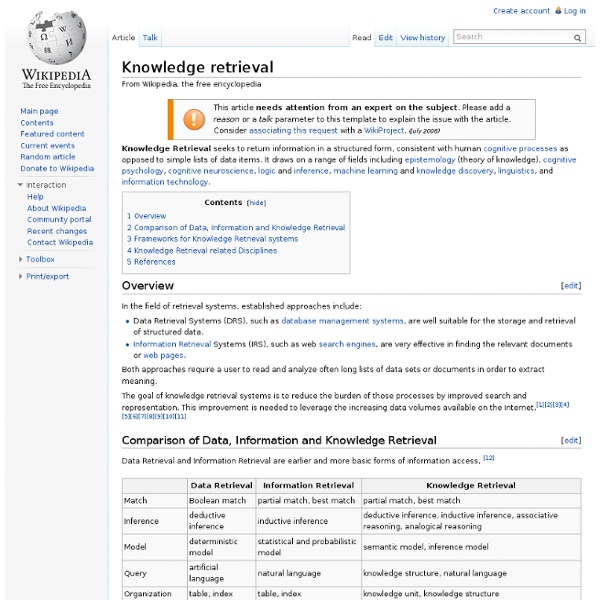15 Effective Tools for Visual Knowledge Management
Since I started my quest a few years ago searching for the ultimate knowledge management tool, I’ve discovered a number of interesting applications that help people efficiently organize information. There certainly is no shortage of solutions for this problem domain. Many tools exist that offer the ability to discover, save, organize, search, and retrieve information. However, I’ve noticed a trend in recent years, and some newer applications are focusing more on the visual representation and relationship of knowledge. I believe this is in part due to the wider adoption of mind mapping (and concept mapping), and leveraging concepts and advances in the semantic web community. 15. Link: Platforms: Win, Mac, Linux Cost: Free (Open Source) DeepaMehta is a “networked semantic desktop” that replaces the traditional computer desktop. 14. Link: Platforms: Mac Cost: $179 Tinderbox stores and organizes your notes, plans, and ideas. 13.
Knowledge extraction
Creation of knowledge from structured and unstructured sources After the standardization of knowledge representation languages such as RDF and OWL, much research has been conducted in the area, especially regarding transforming relational databases into RDF, identity resolution, knowledge discovery and ontology learning. The general process uses traditional methods from information extraction and extract, transform, and load (ETL), which transform the data from the sources into structured formats. So understanding how the interact and learn from each other. The following criteria can be used to categorize approaches in this topic (some of them only account for extraction from relational databases):[2] President Obama called Wednesday on Congress to extend a tax break for students included in last year's economic stimulus package, arguing that the policy provides more generous assistance. Relational databases to RDF [edit] :Peter :marriedTo :Mary . Extraction from structured sources to RDF
Knowledge Management using Mind Maps
Click to download this Mind Map document. In this article, we’ll what a look at knowledge management. Actually more than just knowledge management – we’ll examine how knowledge is created, what it is, and how you can use it. In these days of information overload, the compact way of representing ideas that is embodied in Mind Mapping is essential. From Data to Information We are fed with a huge amount of data all the time, and we are pretty good at sorting through the incoming data and applying our understanding of the relationships between the different pieces of data and its meaning to us, so we can turn the data into information. delete, distort, and filter the data to fit our understanding of the world. From Information to Knowledge This massively reduces the amount of material we need to deal with, and also helps us process new data as it comes along, but still we are overwhelmed with the amount of information. From Knowledge to Wisdom and Understanding Overcoming Boredom
Knowledge Management Software | Document Management Software | Enterprise Content Management | vdocs | Document Scanning | Medical Records Scanning | On-Site Scanning | Wide Format
Knowledge Management Knowledge Management (KM) comprises a range of practices used in an organisation to identify, create, represent, distribute and enable adoption of insights and experiences. Such insights and experiences comprise knowledge, either embodied in individuals or embedded in organisational processes or practice. An established discipline since 1991, KM includes courses taught in the fields of business administration, information systems, management, and library and information sciences. More recently, other fields have started contributing to KM research; these include information and media, computer science, public health, and public policy. Many large companies and non-profit organisations have resources dedicated to internal KM efforts, often as a part of their 'Business Strategy', 'Information Technology', or 'Human Resource Management' departments. Strategies Knowledge Management Knowledge may be accessed at three stages: before, during, or after KM-related activities.
GURTEEN KNOWLEDGE
Knowledge ecosystem
The idea of a knowledge ecosystem is an approach to knowledge management which claims to foster the dynamic evolution of knowledge interactions between entities to improve decision-making and innovation through improved evolutionary networks of collaboration.[1][2] In contrast to purely directive management efforts that attempt either to manage or direct outcomes, knowledge ecosystems espouse that knowledge strategies should focus more on enabling self-organization in response to changing environments.[3] The suitability between knowledge and problems confronted defines the degree of "fitness" of a knowledge ecosystem. Articles discussing such ecological approaches typically incorporate elements of complex adaptive systems theory. Known implementation considerations of knowledge ecosystem include the Canadian Government.[4] Key Elements[edit] To understand knowledge ecology as a productive operation, it is helpful to focus on the knowledge ecosystem that lies at its core. 1. 2. 3. 4.
Global RISK Management Network with Financial Risk Management, Information Technology Risk Management, and Business Risk Management focus on Global Financial Markets, Global Financial Systems, Capital Markets, Digital Business Models, Digital Business Ent
Knowledge organization
The term knowledge organization (KO) (or "organization of knowledge", "organization of information" or "information organization") designates a field of study related to Library and Information Science (LIS). In this meaning, KO is about activities such as document description, indexing and classification performed in libraries, databases, archives etc. These activities are done by librarians, archivists, subject specialists as well as by computer algorithms. KO as a field of study is concerned with the nature and quality of such knowledge organizing processes (KOP) as well as the knowledge organizing systems (KOS) used to organize documents, document representations and concepts. There exist different historical and theoretical approaches to and theories about organizing knowledge, which are related to different views of knowledge, cognition, language, and social organization. Each of these approaches tends to answer the question: “What is knowledge organization?” See also[edit]
Welcome to the best resource on the Internet for the IB Diploma Theory of Knowledge course
Barbara Fillip's Knowledge Management Blog



